
Bonebridge Device: A Life-Changing Solution for Chronic Ear Disease and Hearing Loss
by Brianna Rauchman
Learn about the life-changing Bonebridge device for hearing loss through Ayslyn’s inspiring journey. Find out how Pacific Neuroscience Institute’s Dr. Voelker and Dr. Lewis can help with comprehensive hearing diagnostics and rehabilitative support.
Hearing Loss at Two Years Old: Ayslyn’s Inspiring Story
At two years old, Ayslyn experienced an illness that led to a ruptured eardrum, and irreparably damaged her ear canal. Unfortunately, despite undergoing numerous surgeries, her hearing was always compromised.
As Ayslyn entered adulthood, she pursued her passion for teaching kindergarten. Although unable to fully hear her students’ laughter, Ayslyn found fulfillment and joy in their happy faces.
Bonebridge Device Offers Solution for Hearing Loss
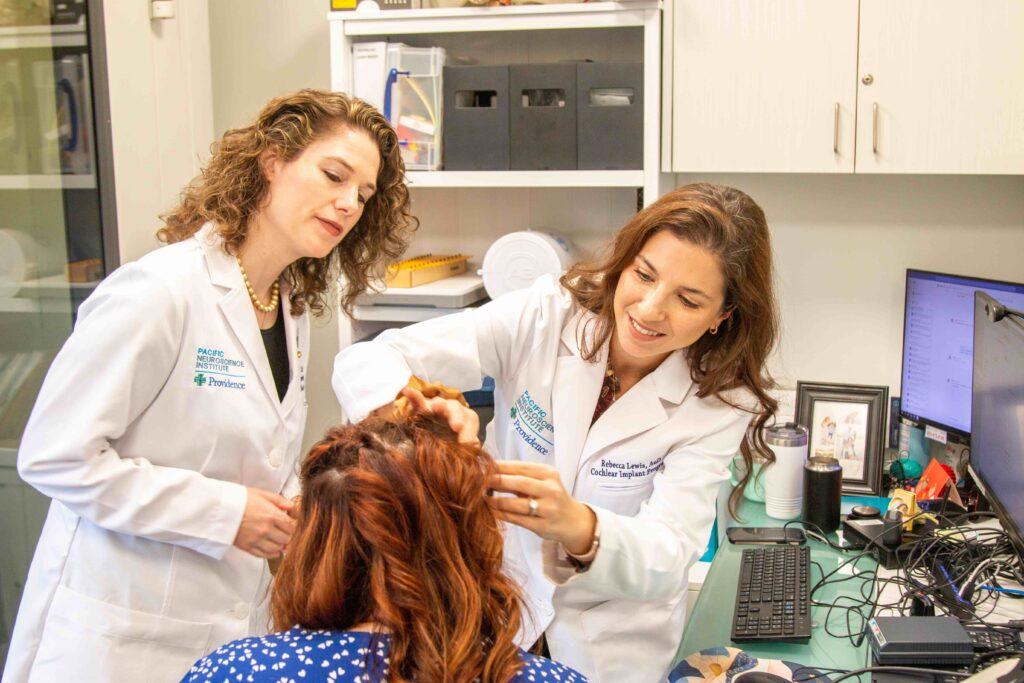
Determined to restore her hearing, Ayslyn turned to Pacific Neuroscience Institute’s renowned Pacific Eye, Ear & and Skull Base Center. There, she met Courtney Voelker, MD, PhD (DPhil Oxon), Director of Otology/Neurotology-Lateral Skull Base Surgery, and Rebecca Lewis, AuD, audiologist and the Audiology Director of the Adult & Pediatric Cochlear Implant Program.
Dr. Voelker identified Ayslyn’s hearing impairment as chronic ear disease, with destructive cholesteatomas (bone cysts) as well as damaged ear bones due to the disease and multiple prior surgeries to prevent further hearing loss.
Dr. Voelker and Dr. Lewis collaborated and ultimately decided upon a bone conduction device called the Bonebridge. This unique hearing device is surgically implanted in the temporal lobe and uses an external magnet to transmit sound data through the bone into the working inner ear.
The Bonebridge for (Ayslyn) was an excellent option because it’s a bone-conduction device that has nothing protruding through the skin, so there’s very little risk of infection. We get to stimulate her sensory organ directly through bone conduction, and it’s a much cleaner, louder sound for her.
Dr. Rebecca Lewis
Bonebridge Implant vs. Cochlear Implant: What’s the Difference?
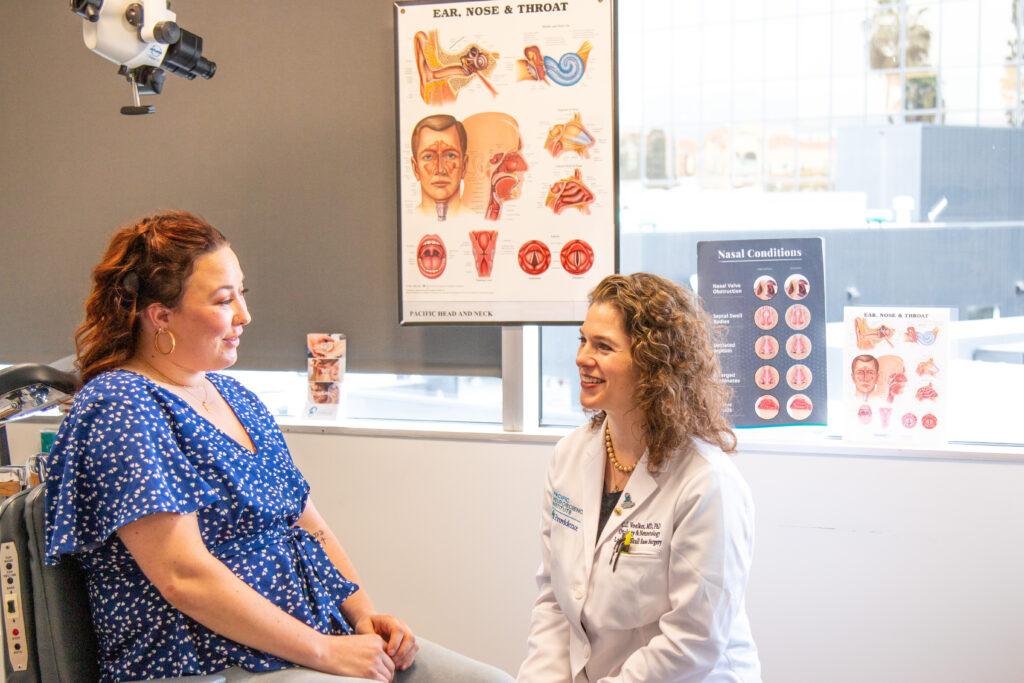
Bonebridge hearing implants are designed for patients with mild to moderate hearing loss. Therefore, individuals with poor conduction due to damage in the external or middle ear greatly benefit from this device.
In contrast, cochlear implants help patients with profound hearing loss. These individuals are not ideal candidates for Bonebridge implants or hearing aids due to their poorly functioning inner ear.
What Is the Process for Receiving a Bonebridge Implant?
Initially, candidates for a Bonebridge implant require extensive evaluation from a neurotologist and audiologist to determine their eligibility. If approved, the provider will schedule an outpatient procedure to insert the device.
Does the Bonebridge Implant Cure Hearing Loss?
The Bonebridge implant (or any surgically implanted hearing device) is not a cure-all for hearing loss. However, patients often regain the ability to distinguish speech and hear everyday sounds, such as doorbells or music, much more clearly than before the implant.
The Life-Changing Impact of Ayslyn’s Bonebridge Surgery

Ayslyn’s Bonebridge surgery successfully transformed her life. Assisted by her hearing device, Ayslyn engages in classroom activities and communicates with her students in ways that were once near impossible. The dynamic sounds of daily life, previously muted or nonexistent, now fill her world with wonder and possibility.
Ayslyn has been deeply grateful to Dr. Voelker, Dr. Lewis, and the team at PNI, for providing her with a fresh lease on life.
With my new device, my work has drastically changed, in my opinion, because I can actually hear my students. It’s a whole new world…Everybody’s just been phenomenal and it’s been a journey that I knew I was going to have to take, but now that I’m in that journey, it is even better than I thought it could have ever been.
Ayslyn
Hearing loss diagnostics available at PNI
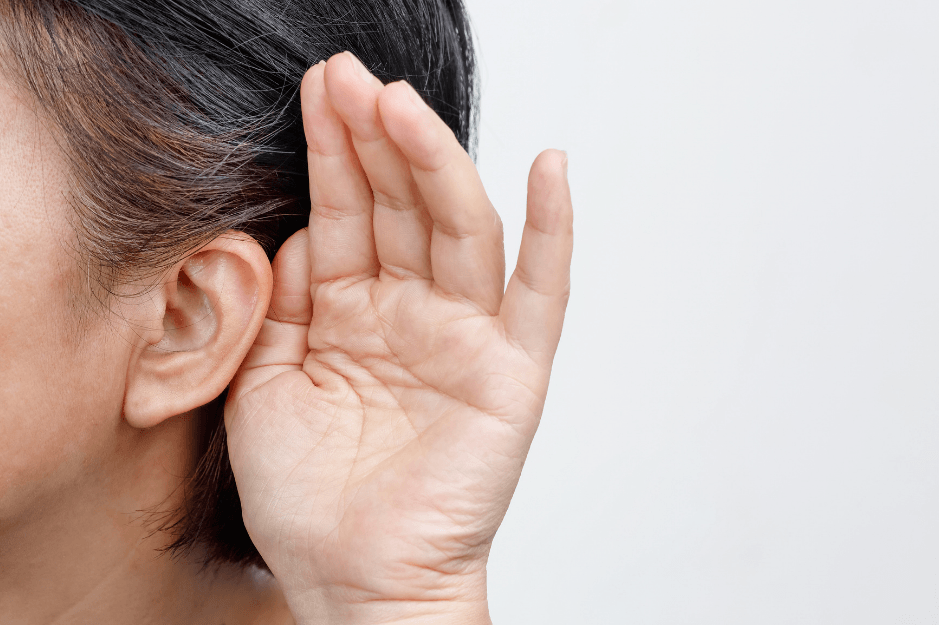
At PNI’s Pacific Eye, Ear, and Skull Base Center, we offer comprehensive audiologic and otologic evaluations to establish baseline hearing health and follow-up care.
If you or a loved one struggles with hearing loss or tinnitus, we offer rehabilitative support, including custom hearing protection, hearing aids, hearing implant evaluations, and counseling.
We understand the importance of hearing. It plays a vital role in connecting us with friends, family, and coworkers. Enhance your quality of life with our team of skilled professionals at the Pacific Eye, Ear, and Skull Base Center.
More information: 310-477-5558
About Courtney Voelker, MD, PhD
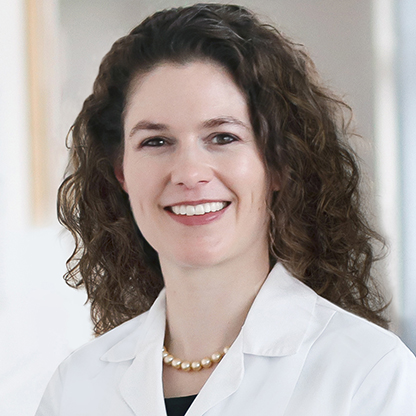
Courtney Voelker, MD, PhD (DPhil Oxon), is a Rhodes Scholar and board-certified neurotologist. She is Director of Otology/Neurotology-Lateral Skull Base Surgery; and Director of the Adult & Pediatric Cochlear Implant Program at Pacific Neuroscience Institute. She is an otolaryngology – head & neck surgeon who takes care of adult and pediatric patients seeing a wide range of inner ear and skull base conditions. Highly accomplished in the clinic and in research, she is committed to offering top quality, compassionate care to all her patients.
About Rebecca Lewis, AuD
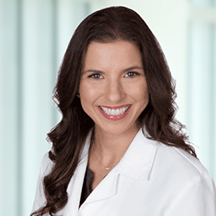
Rebecca Lewis, AuD, is an audiologist and the Audiology Director of the Adult & Pediatric Cochlear Implant Program at Pacific Neuroscience Institute. She also holds the position of Adjunct Professor at Mount Saint Mary University / John Tracey Deaf and Hard of Hearing program. She has provided rehabilitative services including hearing aids, hearing protection, Osseo integrated devices, auditory brainstem implant and cochlear implant (CI) services to adults and children.
Related Links:
About the Author
Brianna Rauchman
Brianna Rauchman, BA, is the Communications Coordinator for the Lifestyle Program, where she helps develop outreach strategies to connect with an expanding audience. Her responsibilities include providing launch support, developing content, assisting with collateral design, and planning social media strategies.
Last updated: May 19th, 2023
